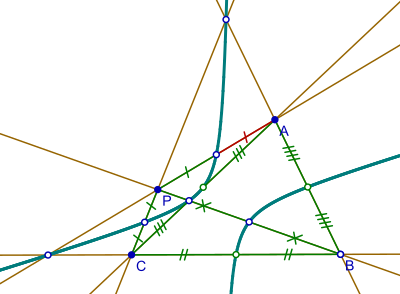Nine-point conic

In geometry, the nine-point conic of a complete quadrangle is a conic that passes through the three diagonal points and the six midpoints of sides of the complete quadrangle.
The nine-point conic was described by Maxime Bôcher in 1892.[1] The better-known nine-point circle is an instance of Bôcher's conic. The nine-point hyperbola is another instance.
Bôcher used the four points of the complete quadrangle as three vertices of a triangle with one independent point:
- Given a triangle △ABC and a point P in its plane, a conic can be drawn through the following nine points:
- the midpoints of the sides of △ABC,
- the midpoints of the lines joining P to the vertices, and
- the points where these last named lines cut the sides of the triangle.
The conic is an ellipse if P lies in the interior of △ABC or in one of the regions of the plane separated from the interior by two sides of the triangle, otherwise the conic is a hyperbola. Bôcher notes that when P is the orthocenter, one obtains the nine-point circle, and when P is on the circumcircle of △ABC, then the conic is an equilateral hyperbola.
In 1912 Maud Minthorn showed that the nine-point conic is the locus of the center of a conic through four given points.[2]
The nine-point conic with respect to a line l is the conic through the six harmonic conjugates of the intersection of the sides of the complete quadrangle with l.
References
[edit]- ^ Maxime Bôcher (1892) Nine-point Conic, Annals of Mathematics, link from Jstor.
- ^ Maud A. Minthorn (1912) The Nine Point Conic, Master's dissertation at University of California, Berkeley, link from HathiTrust.
- Fanny Gates (1894) Some Considerations on the Nine-point Conic and its Reciprocal, Annals of Mathematics 8(6):185–8, link from Jstor.
- Eric W. Weisstein Nine-point conic from MathWorld.
- Michael DeVilliers (2006) The nine-point conic: a rediscovery and proof by computer from International Journal of Mathematical Education in Science and Technology, a Taylor & Francis publication.
- Christopher Bradley The Nine-point Conic and a Pair of Parallel Lines from University of Bath.
Further reading
[edit]- W. G. Fraser (1906) "On relations of certain conics to a triangle", Proceedings of the Edinburgh Mathematical Society 25:38–41.
- Thomas F. Hogate (1894) On the Cone of Second Order which is Analogous to the Nine-point Conic, Annals of Mathematics 7:73–6.
- P. Pinkerton (1905) "On a nine-point conic, etc.", Proceedings of the Edinburgh Mathematical Society 24:31–3.
